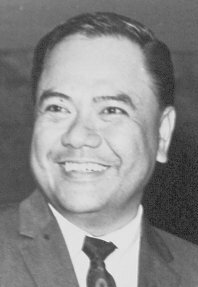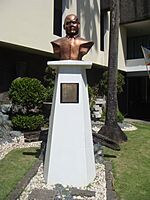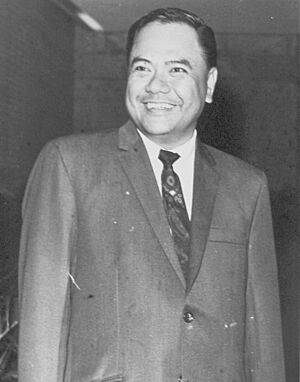Blas Ople facts for kids
Quick facts for kids
Blas Ople
|
|
|---|---|
 |
|
| 17th President of the Senate of the Philippines | |
| In office June 29, 1999 – July 12, 2000 |
|
| President | Joseph Estrada |
| Preceded by | Marcelo Fernan |
| Succeeded by | Franklin Drilon |
| 17th and 19th President pro tempore of the Senate of the Philippines | |
| In office October 10, 1996 – June 29, 1999 |
|
| Preceded by | Leticia Ramos Shahani |
| Succeeded by | John Henry Osmeña |
| In office July 12, 2000 – June 30, 2001 |
|
| Preceded by | John Henry Osmeña |
| Succeeded by | Manuel Villar |
| 22nd Secretary of Foreign Affairs | |
| In office July 16, 2002 – December 14, 2003 |
|
| President | Gloria Macapagal Arroyo |
| Preceded by | Gloria Macapagal Arroyo (acting) |
| Succeeded by | Franklin Ebdalin (acting) |
| Senator of the Philippines | |
| In office June 30, 1992 – July 16, 2002 |
|
| Minister of Labor | |
| In office 1972 – February 25, 1986 |
|
| President | Ferdinand Marcos |
| Preceded by | Adrian E. Cristobal |
| Succeeded by | Augusto Sanchez |
| Secretary of Labor | |
| In office September 16, 1967 – 1971 |
|
| President | Ferdinand Marcos |
| Preceded by | Emilio Espinosa, Jr. |
| Succeeded by | Adrian E. Cristobal |
| Mambabatas Pambansa (Assemblyman) from Bulacan | |
| In office June 30, 1984 – March 25, 1986 Served with: Jesus S. Hipolito Rogaciano M. Mercado Teodulo C. Natividad |
|
| Mambabatas Pambansa (Assemblyman) from Central Luzon | |
| In office June 12, 1978 – June 5, 1984 |
|
| Member of the Philippine Constitutional Commission | |
| In office June 2, 1986 – October 15, 1986 |
|
| President | Corazon Aquino |
| Personal details | |
| Born |
Blas Fajardo Ople
February 3, 1927 Hagonoy, Bulacan, Philippine Islands |
| Died | December 14, 2003 (aged 76) Taoyuan, Taiwan |
| Resting place | Libingan ng mga Bayani 14°31′16″N 121°2′34″E / 14.52111°N 121.04278°E |
| Political party | Laban ng Demokratikong Pilipino (1992–2003) |
| Other political affiliations |
Kilusang Bagong Lipunan (1978–1992) Nacionalista (until 1972) |
| Spouse | Susana Ople |
| Children | 7, including Susan |
| Alma mater | Manuel L. Quezon University (BA) |
| Occupation | Journalist; Politician |
Blas Fajardo Ople (born February 3, 1927 – died December 14, 2003) was an important Filipino journalist and politician. He held many high-ranking jobs in the Philippine government. These included being the Senate President from 1999 to 2000. He also served as the Secretary of Foreign Affairs from 2002 until he passed away.
One of Ople's most lasting roles was his nineteen years as the Secretary (later Minister) of Labor and Employment. This was during the time of President Ferdinand Marcos. During this period, Philippine labor laws were greatly improved. He helped create the Labor Code of the Philippines, which brought many new rules for workers' rights.
Contents
Early Life and Career
Blas Ople was born in Hagonoy, Bulacan on February 3, 1927. His father, Felix Antonio Ople, was a craftsman who fixed boats. Blas finished elementary school in 1941 as the top student in his class.
When Japan invaded the Philippines during World War II, teenage Ople joined the guerilla movement. He fought with groups like the Del Pilar Regiment. After the war, he finished high school in Manila in 1948. He then studied liberal arts at Quezon College.
After college, Ople became a journalist. He worked as a desk editor for the Daily Mirror newspaper. He also wrote a column called Jeepney Tales. He was one of the youngest newspaper columnists at that time. Ople also started his own company that helped with public relations.
He became known for his strong belief in nationalism, which means loving and supporting one's own country. In the 1950s, he helped start a group called Kilusang Makabansa. This group often spoke about nationalism and fairness in society. In 1953, he helped with the presidential campaign of Ramon Magsaysay. After Magsaysay won, Ople worked in the government. He was a special assistant to the Secretary of Labor.
Secretary of Labor and Worker Rights
In 1965, President Ferdinand E. Marcos appointed Ople as Social Security Commissioner. In 1967, he became the Secretary of Labor and Employment. This job was later renamed Minister of Labor and Employment in 1978. He held this position until 1986.
As Labor Secretary, Blas Ople played a big part in creating the Labor Code of the Philippines. This code brought together all the labor laws of the country. It also added new rules, like stopping employers from firing workers without a good reason. Ople also started programs to help workers get technical training.
In 1976, Ople began a program for Filipinos to work overseas. During his time, the Philippine Overseas Employment Administration (POEA) was created. This agency helps Filipinos find jobs abroad safely. The Overseas Workers Welfare Administration (OWWA) was also created to help Filipino workers overseas.
Ople received special recognition from the International Labour Organization (ILO). In 1975, he was chosen to be the president of the 60th International Labour Conference. He was the first Filipino to hold this important position. In 1983, the ILO gave Ople a Gold Medal of Appreciation.
He was a close advisor to President Marcos. However, he was not linked to any corruption during the Marcos government. In 1984, he made headlines by saying that President Marcos was too ill to make big decisions. Marcos later showed himself to the public to prove he was not seriously ill.
In 1978, Ople was elected as an assemblyman for Central Luzon. He was reelected in 1984. During the 1986 Philippine presidential election, Ople managed President Marcos's campaign. Just before the People Power Revolution in 1986, Marcos sent Ople to Washington, D.C. to talk to the American government. Ople was in Washington when the revolution started. He was advised to tell Marcos to resign. However, Ople publicly supported Marcos in the American media.
Helping Draft the New Constitution
After the People Power Revolution, Corazon Aquino became president. Ople was no longer in the Cabinet. He returned to the Philippines and tried to lead the political groups against Aquino.
However, in May 1986, President Aquino asked Ople to join the Constitutional Commission. This group was tasked with writing a new Philippine Constitution. Ople accepted this important role.
In the 1987 elections, Ople ran for the Philippine Senate again but did not win. He then worked as chairman of the Institute for Public Policy. This group studied different policies.
Senator of the Philippines
In 1992, Blas Ople ran for the Senate once more and was elected. He served a six-year term. In the Senate, he led the Foreign Relations Committee. He also became the Senate President Pro-Tempore in 1998. This role means he was the second-highest leader in the Senate.
Ople was re-elected to the Senate in 1998. In 1999, he became the President of the Senate after Marcelo Fernan resigned. As Senate President, he strongly supported the 1999 RP-US Visiting Forces Agreement. This agreement allowed American forces to visit the Philippines for short training exercises. He stepped down as Senate President in 2000.
Later that year, he was one of the senators who judged the impeachment trial of President Joseph Estrada. He voted with others to block the opening of an envelope that was thought to contain proof of corruption. This vote caused public anger and led to the EDSA Revolution of 2001. This event removed Estrada from power and made Vice-President Gloria Macapagal Arroyo the new president.
Secretary of Foreign Affairs
In July 2002, President Gloria Macapagal Arroyo appointed Ople as Secretary of Foreign Affairs. This decision caused some discussion. Weeks before, the Vice-President, Teofisto Guingona, had resigned from the same job. He disagreed with the plan to let American troops help fight terrorist groups in the Philippines. Ople had supported the Visiting Forces Agreement earlier. He was seen as more open to the plan.
As Secretary of Foreign Affairs, Ople was key in talks about American military forces in the Philippines. He made sure that American troops would not take part in actual fighting missions. During his time, the American and Filipino governments signed an agreement. This agreement gave immunity to citizens of both countries from certain international charges. Ople also supported the Iraq War. He pushed for a small group of Filipino soldiers to be sent to Iraq.
Death and Lasting Impact

In the months before he died, Ople had poor health. He often used a wheelchair at international meetings. On December 13, 2003, Ople had trouble breathing on a flight from Bangkok to Tokyo. The plane landed in Taiwan, and Ople was taken to a hospital. He passed away on Sunday, December 14, 2003.
President Arroyo said Ople was "an architect of Philippine foreign policy." U.S. Secretary of State Colin Powell called him "one of the pivotal figures" in Philippine history. Some critics called him a "political chameleon" but also said he was "a consistent, brilliant and very astute politician."
Time magazine wrote about Ople's intelligence and his ability to survive in politics. They mentioned his deep voice. They also wrote that during the People Power Revolution, Ople told Marcos that American support was weakening. Marcos then asked Ople to contact the Soviet government. Ople refused this request.
Blas Ople is buried at the Libingan ng mga Bayani, which is the National Heroes' Cemetery. In 2004, President Arroyo appointed Ople's daughter, Susan Ople, to a position in the Department of Labor and Employment.
The building that used to house the Philippine Overseas Employment Administration was renamed the Blas F. Ople Building in his honor on February 4, 2004.
Images for kids
 | Valerie Thomas |
 | Frederick McKinley Jones |
 | George Edward Alcorn Jr. |
 | Thomas Mensah |



